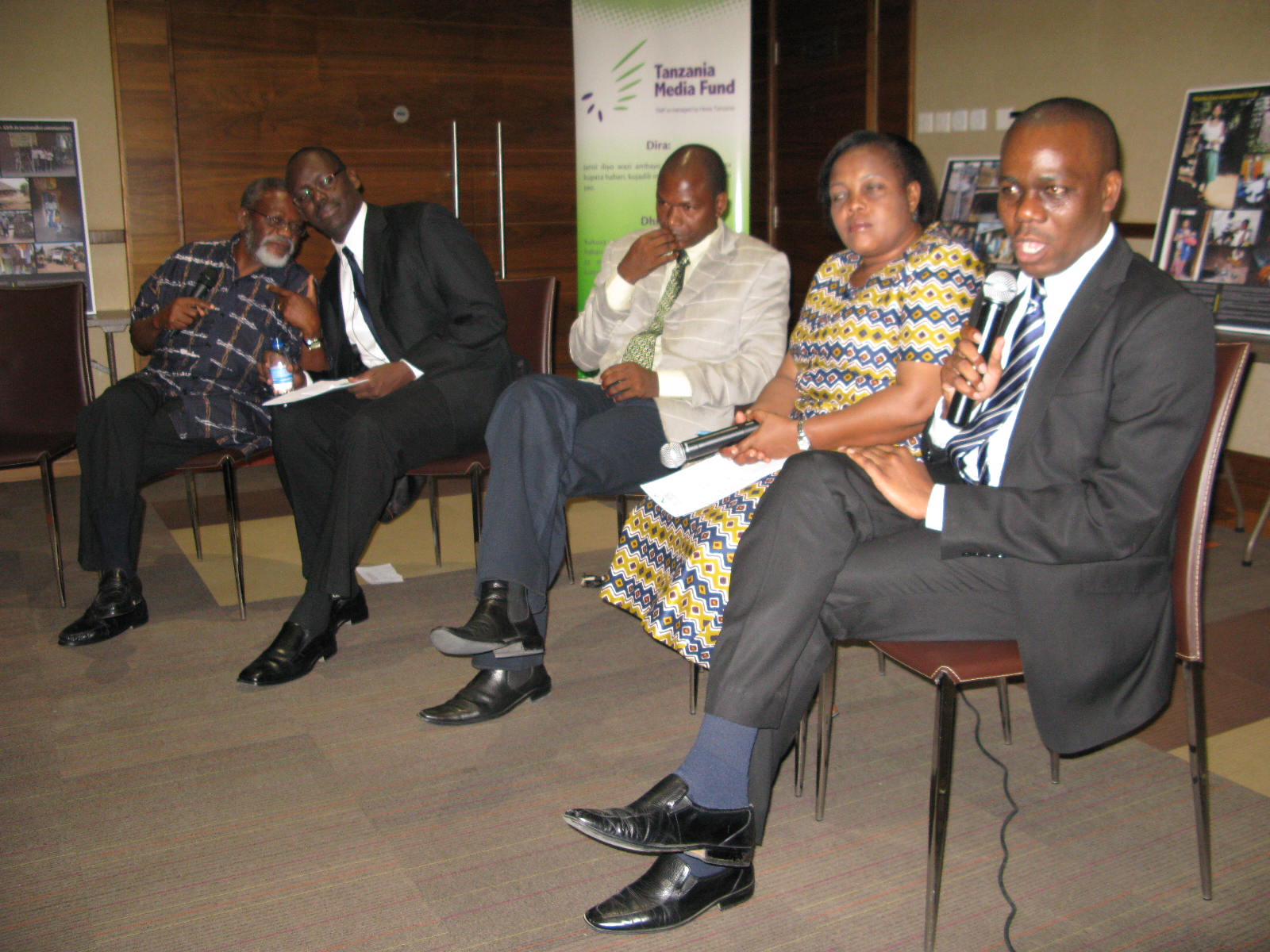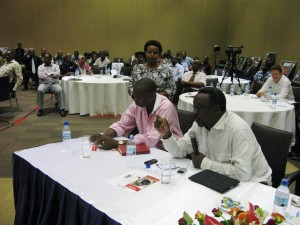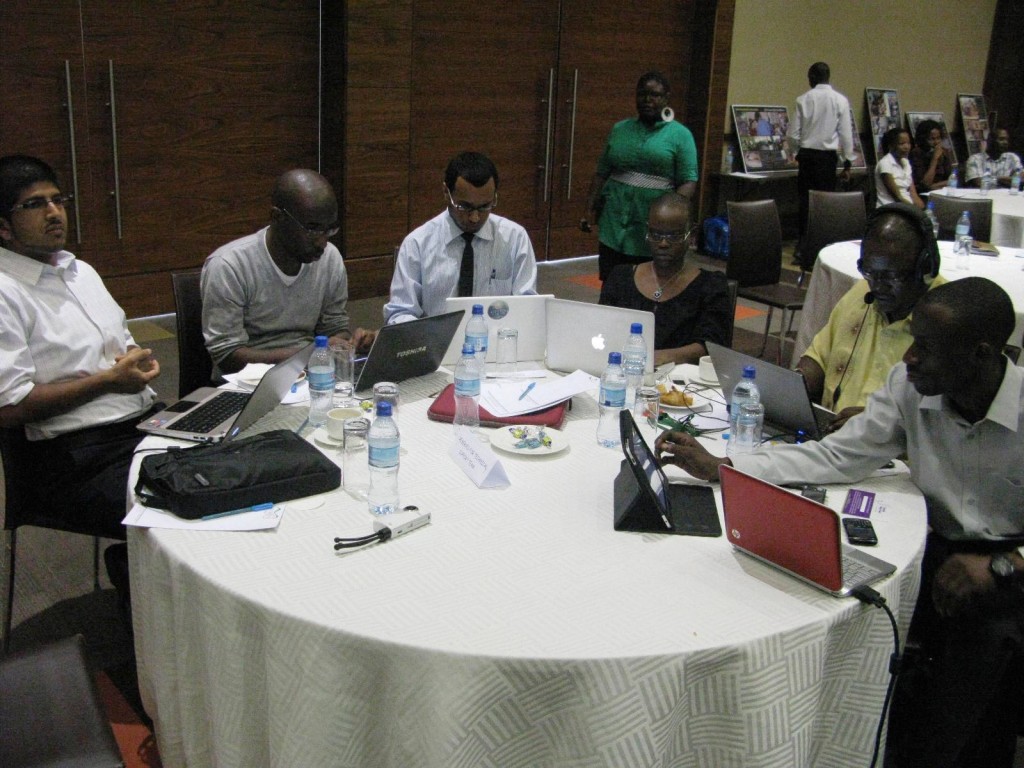The Tanzania Media Fund (TMF) Forum brought stakeholders in the media industry together to showcase the success of TMF’s work, debate issues of governance and accountability within the industry, as well as award those who have leveraged TMF’s resources.
The morning began with some remarks from members of TMF and invited panelists. We then watched a brief video highlighting TMF successes through its programs amongst others — for example, uncovering rape cases in Zanzibar and the grant to Kili FM that enabled them to reach remote villages and perform ‘real’ reporting on issues faced by villagers.
Next came the debate on media governance and accountability in Tanzania. On the panel were Adam Simbeye (Host of This Week In Perspective — TBC One), Ichikaeli Maro (Editor — Daily News), Richard Mgamba (Editor — The Guardian, IPP Media), Hon. Zitto Kabwe (MP — Kigoma North) and Aidan Eyakuze (Moderator — Serengeti Advisors). The debate started of slow but quickly became heated as various rival newspaper representatives joined in and voiced their opinions. Key questions asked were: To whom are journalists accountable? What ethical standards should they be abiding by?

A general consensus on the floor could be sensed that journalists should conduct their duties for the good of the society no matter who pays their bills (the private sector or the government). This, however, could be that usual political correctness jargon with few concrete examples given. It was obvious that representatives from ‘government-run’ media houses were ambivalent on this note.
What has been a major achievement in the current regime is the expansion of the freedoms of the press. In previous years it was common to hear — regularly — of newspaper bans for numerous dubious reasons. As these freedoms continue, stakeholders are calling for the adherence to ethics and guidelines of the journalism profession.
During the debate there were audience interjections that claimed certain news features are paid for by people in power to save face; or too much interference from owners who do not subscribe to ethics of journalism. On the same note a reporter from Raia Mwema made an interesting remark that, “It’s impossible to get a clean media from a closed society.” And Hon. Zitto Kabwe supported this by claiming a large proportion of Dar es Salaam residents do not trust each other, thus raising the question of media trust.

Should we go forth and change our societal norms first — on accountability, transparency, and openness — before we work on the problems of the media? Or, is the media itself charged with this duty to gradually change a society? Jenerali Ulimwengu, that veteran journalist portrayed this by saying that Tanzania media is a perfect portrayal of Tanzanians themselves and that “the rot is everywhere; in the business community, judicial, the police”. Nevertheless, he encouraged that we should support that best crop of journalism that exists in Tanzania media.
The theme on the role of the new media (blogs, facebook, twitter etc.) in the current society was also addressed. Many said that this new form of delivery of information is vital for a fast, breaking-news type of information. But for a majority, trusted news is still on the conventional print-media. For a society like Tanzania, the growing popularity of these kinds of non-traditional news sharing is welcomed by many; however, we should note that the majority of Tanzanians lack this access and only a privileged few who are directly gaining from these advances. The mobile phone industry is changing this.

After the debate the guest of honor, Dr. Fenella Mukangara — Deputy Minister of Information & Culture — finally showed up just over 3 hours delay and made the keynote speech. Her speech reiterated the key need to bring more rural news into media. She also encouraged journalists to develop their network of sources and leverage the local government (Serikali za Mitaa). Before departing, Dr. Mukangara launched TMF’s grantee Flame Tree Media Trust’s photography journalism exhibition.
The event wrapped up with award presentation to journalists who participated in the TMF Online Journalism, Mobile Phone Journalism Project or received a TMF fellowship. The TMF work is laudatory and many are looking forward to their continuing efforts to push for above-the-standard journalism work.
Related Links:


As a journalist by training, I am happy to see that such a forum took place and important issues such as these were discussed, but I do have one reservation, or rather challenge, that I think the Tanzanian media industry really needs to address rather fast. The idea that more support needs to be given to the best crop of journalism that exists in Tanzania media is something we talk about and have been talking about but it is something that we do not practice, and to this day, I am still perplexed by this.
I went into journalism because I wanted to help tell the stories that make Tanzania, Tanzania; stories that matter to the people, no matter what part of the country they are from. Initially, I thought this was easy, with a Master’s degree in journalism, would it be that hard to find an average paying job in journalism in Dar? Surprisingly it is, and quite often, I was met with mixed feelings – a young woman, highly proficient in English, with a foreign journalism degree – you would think these were enough reasons to get me employed, but not so quick. I approached the largest media house only to be told that I had to be an “intern” (paid 3,000/= a day, which I never saw) first before I could get employment; apparently those are their employment rules. Other media houses pay 10,000/= per article, an article that you can struggle to get quotes for, make hundreds of calls which would cost you more than 10,000/= anyway, struggle in traffic jams just to get to the venue to get your story – and you are told oh, yes, we can only pay you 10,000/= for that story. Really?
Now for those of us who love journalism and have a home to go to (with rent and food paid by the parents), this is fine. But what about those good journalists who have to do this for a living? Why is the media industry (which makes millions of shillings) not investing and supporting their journalists by? Without journalists, what is the media? We want to encourage investigative journalism in Tanzania, but how can we when the industry is so profit driven that people worry not about the quality of journalism but rather filling the pages with whatever stories they can find?
If we look at our neighbours, in Kenya, in Rwanda, I must say their journalism is way above ours. There are journalists who have been around for yours and are still practicing their profession – there must be a reason for this. I look at Tanzania, and I can only find a few names of journalists who are known for their quality of work; there’s Jenerali Umwengu, there was my mother, back in the day, and a few others in her generation – nowadays, it seems anyone is a journalist; bylines change too fast!
I love Tanzania with all my heart, I love journalism even more, but trying to be taken seriously as a journalist in Tanzania is not an easy task. Media houses have a big role to play, in supporting their journalists AND in focusing on local and national stories. As a country, we have ENOUGH stories to tell, and sometimes I am shocked to see how some English newspapers turn to fluffy news stories from google to fill their pages.
We have the talent, we have the stories – but when will our industry finally wake up and smell the coffee? When will they see that it is actually their journalists that make their media, it is journalists and the way they tell their stories that make a difference, that sell a newspaper, that gets viewers glued to their TV screens and radios.
Until then, journalists like myself have very few options.
@Khairoon – one option I think you *should* have as a journalist is to be able to shop your piece around to any media house. At least, I think this would work well in Tanzania, since it would provide incentives for media houses to pay well for good content, and it would provide incentives for journalists to produce good stuff.
I REAL HOPE THIS GOING TO HELP THE DEVELOPMENT OF MASS MEDIA AND DEVELOPMENT OF OUR CUREER WE UPCOMING JOURNALIST